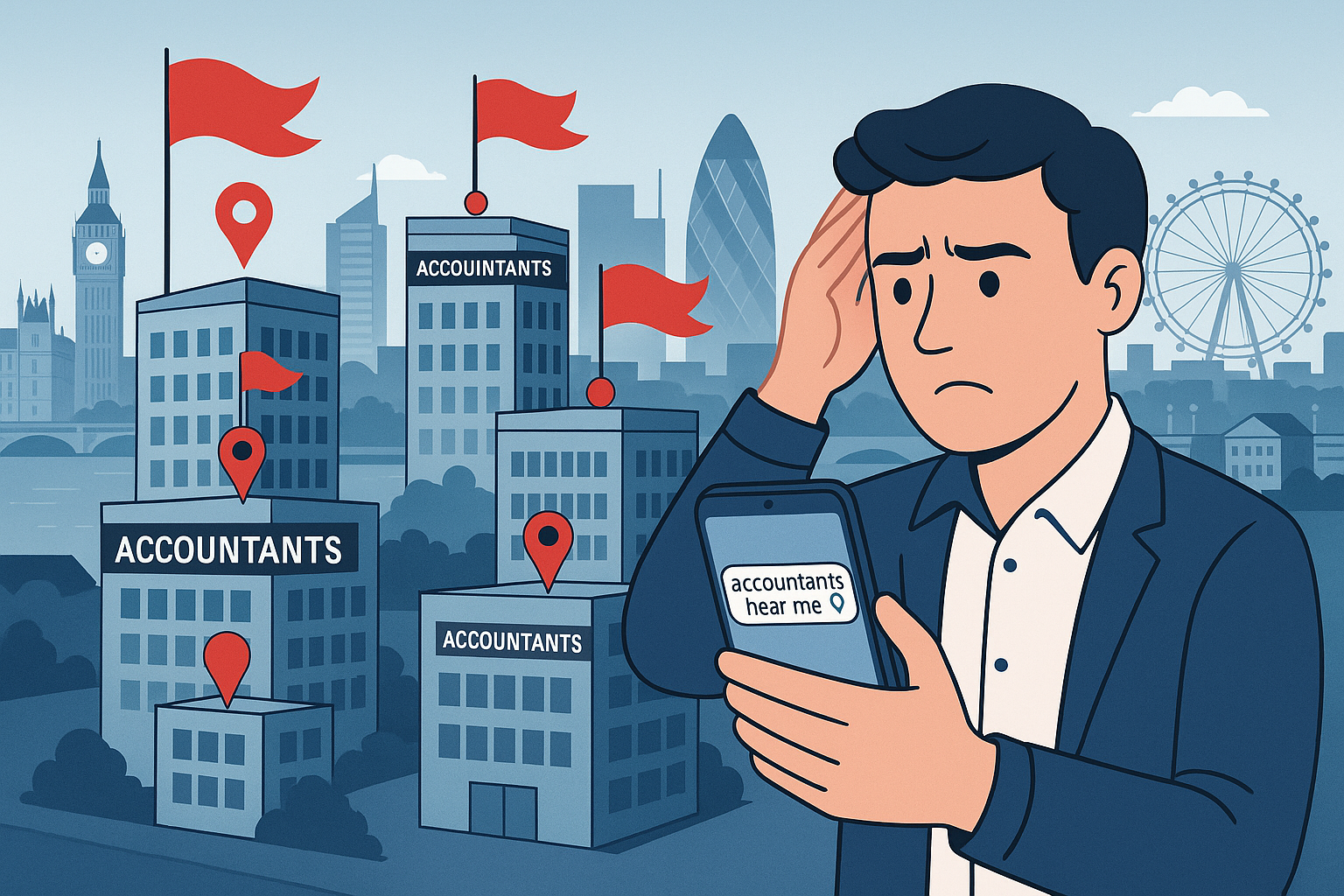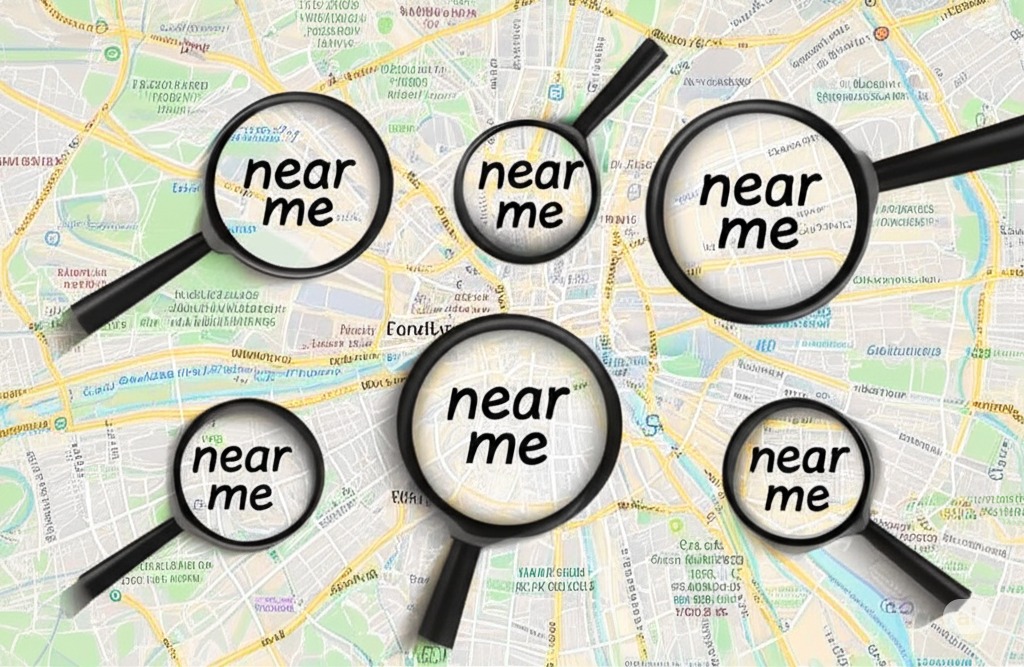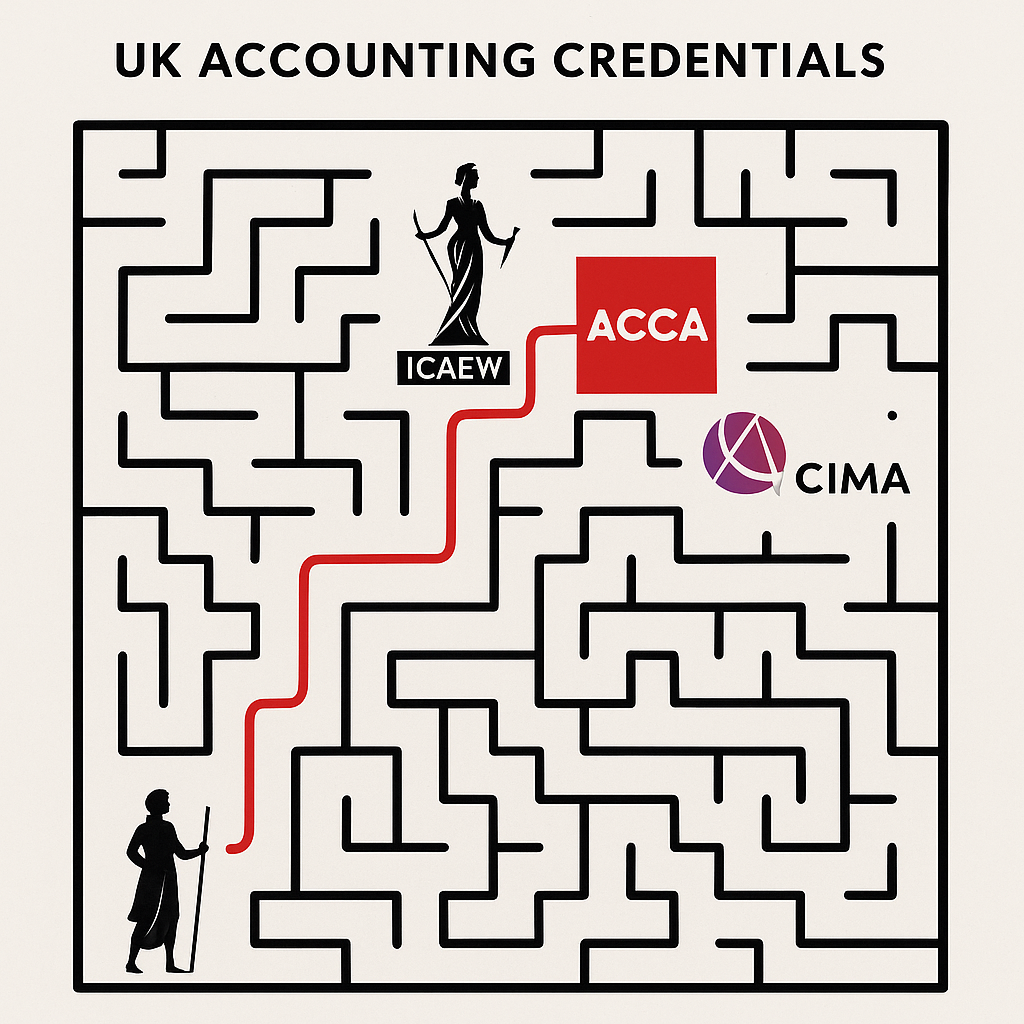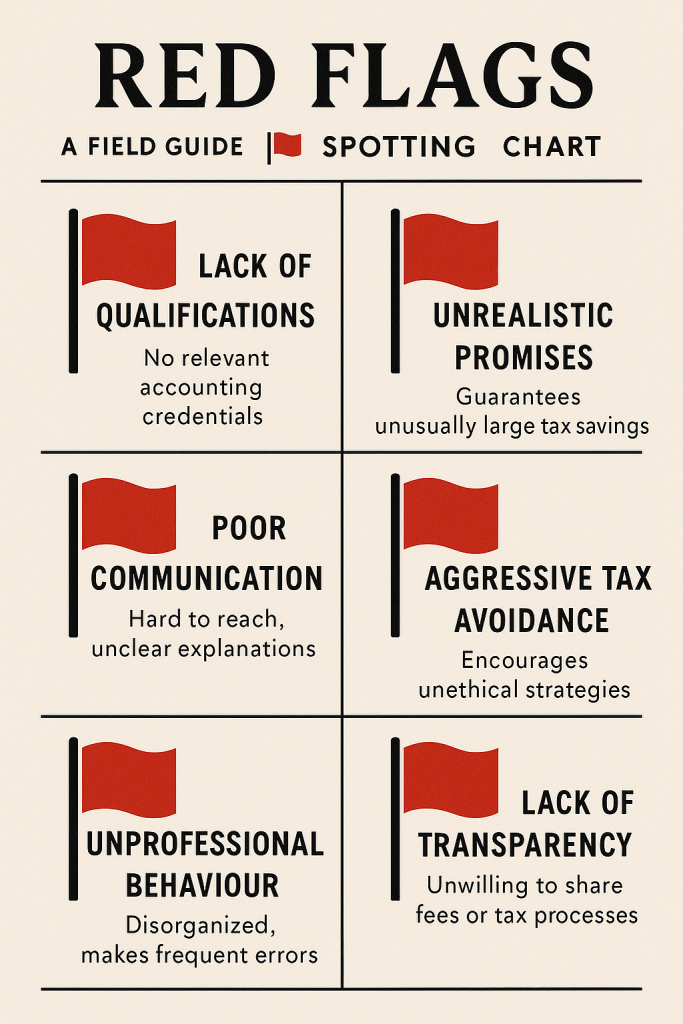
Finding the right accountant isn’t just about proximity—it’s about partnership. In the maze of London’s financial services landscape, the “accountants near me” search can yield hundreds of results, but which one deserves your trust? I’ve spent years navigating this terrain, and let me tell you—not all local accounting services are created equal. Some might even cost you more than they save.
The thing is, a subpar accountant rarely announces themselves as such. They don’t wear warning labels or send up flares signaling their inadequacies. Instead, the red flags flutter quietly, often overlooked by busy entrepreneurs and individuals desperate for tax help. These subtle warnings might seem insignificant at first glance—a delayed response here, a vague answer there—but they can foreshadow serious problems down the line.
So let’s peel back the professional veneer and talk about what really matters when you’re looking for accountants in your area. I’ll share the warning signs that make me personally run for the hills, and why you should too.
When “Near Me” Isn’t Enough: The Proximity Trap
We’re all guilty of it—that instinctive habit of valuing convenience above all else. I nearly fell into this trap myself last year when my previous accountant retired. There was this office just two streets away from me, practically beckoning with its proximity. So tempting! But proximity alone can be a dangerous criterion.
The truth? In today’s digital world, your accountant doesn’t need to share your postcode to deliver exceptional service. Many London-based accounting firms (including Ask Accountants) operate seamlessly with clients across the city through a mix of in-person meetings and digital communications. What matters far more than location is expertise, reliability, and the right specialization for your specific needs.
That said, having local knowledge does matter—especially when it comes to understanding the unique business landscape of different London neighborhoods. An accountant who understands the specific challenges of operating in Mayfair versus Shoreditch can provide more tailored business advice. But don’t mistake mere physical presence for local expertise.

The Communication Disaster: When Silence Speaks Volumes
We’ve all been there—that eerie void where responses should be. You send an urgent email about your tax deadline… and nothing. You leave a voicemail about a concerning letter from HMRC (His Majesty’s Revenue and Customs)… and crickets. Days pass. Your anxiety grows. This isn’t just annoying; it’s a massive red flag.
Watch carefully for these communication warning signs during your initial interactions:
- Takes more than 48 hours to respond to your initial inquiry
- Can’t clearly explain their fee structure when directly asked
- Speaks in overly technical jargon without bothering to check if you understand
- Interrupts you repeatedly during your consultation
- Seems distracted or disinterested in your specific situation
- Makes you feel silly for asking “basic” questions
Remember: if they’re difficult to reach before you’re paying them, imagine the frustration once they’ve secured your business. Good accountants (like those at Ask Accountants) pride themselves on clear, timely communication—it’s the foundation of the relationship.

The Suspiciously Low-Ball Quote
When I was shopping around for accounting services last year, I received quotes that varied by hundreds of pounds. The cheapest one? Almost too good to be true. And that’s exactly what it was.
Here’s what I’ve learned: exceptionally low fees often hide a multitude of issues. Sometimes it’s a bait-and-switch tactic—you’ll get hit with “additional” or “unexpected” charges later. Sometimes it reflects inexperience or a volume-based approach where your business becomes just another number in the assembly line. And sometimes—in the worst cases—it signals desperation for clients due to reputation problems.
Does this mean you should automatically choose the most expensive option? Absolutely not! But you should understand precisely what you’re getting for your money. A transparent accountant will break down their fees and explain exactly what services are included—and which ones cost extra.
Ask yourself: is this price realistic for the level of service being promised? If someone’s offering comprehensive self-assessment, business accounting, and tax advisory services for a fraction of the market rate, your skepticism is warranted.
The No-Questions Accountant: Too Good to Be True
This might seem counterintuitive. Surely an accountant who accepts everything you say without question is making your life easier, right? Wrong. So very wrong.
A quality accountant should be naturally curious about your financial situation. They should ask probing (sometimes uncomfortable) questions because that’s how they uncover opportunities to save you money or protect you from compliance issues. If your initial consultation feels more like a casual chat than a professional drilling down into the specifics of your circumstances, consider it a warning sign.
I once worked with an accountant who never questioned a single expense I submitted. Seemed great at the time—so easygoing! Then came the HMRC inquiry (something Ask Accountants can help with dealing with HMRC investigations), and suddenly his lack of diligence didn’t seem so convenient anymore.
Good accountants are thorough. They’ll push back when necessary. They’ll suggest alternatives. And yes, sometimes they’ll tell you things you don’t want to hear—because their job isn’t to be your friend; it’s to be your financial guardian.
The One-Size-Fits-All Approach
Not all businesses are the same, so why would all accounting solutions be identical? If an accountant starts recommending services without thoroughly understanding your specific situation, back away slowly.
Take small business accounting, for instance. The needs of a local café differ dramatically from those of a tech startup or a freelance graphic designer. An accountant offering cookie-cutter solutions without tailoring their approach to your specific industry, growth stage, and goals isn’t doing their job properly.
At Ask Accountants, we’ve seen the damage this approach can cause. One of our clients came to us after their previous accountant had them on an unnecessarily complex accounting system that was designed for companies ten times their size. They were paying for features they didn’t need while missing benefits specifically designed for their industry.
Look for an accountant who takes the time to understand your business model, asks about your growth plans, and tailors their services accordingly. Their recommendations should reflect your unique situation, not a one-size-fits-all template.
The Tech-Resistant Dinosaur
Let’s be blunt: it’s 2025. If your prospective accountant is still primarily working with paper records and spreadsheets, you might as well hire a scribe with a quill pen.
Modern accounting isn’t just about number-crunching—it’s about leveraging technology to provide insights, improve efficiency, and enhance compliance. An accountant resistant to embracing digital tools like cloud accounting software (e.g., Xero, QuickBooks, FreeAgent), automated receipt processing, or digital client portals is likely falling behind in other areas of their professional development too.
This doesn’t mean they need to be early adopters of every new financial tech tool on the market. But they should demonstrate comfort with current industry-standard software and show a willingness to integrate with your existing systems.
During initial consultations, ask about their technology stack. Do they use cloud accounting software? How do they handle document sharing? What’s their approach to digital signatures? Their answers will tell you whether they’re equipped to provide efficient service in today’s digital economy.
| Warning Sign | What It Might Mean | Questions to Ask |
|---|---|---|
| Reluctance to adopt cloud accounting | Resistance to change; potential security issues | What accounting software do you use and recommend? |
| Requires paper receipts | Inefficient processes; higher chance of errors | How do you handle receipt capturing and expense tracking? |
| No client portal | Potential data security concerns; limited access | How will we securely share financial documents? |
| Limited knowledge of integration options | Might not understand modern business operations | Can your systems integrate with my existing business software? |
The Qualification Question: Credentials That Count
Not all accounting qualifications are created equal, and in the UK, the landscape can be particularly confusing. I’ve met business owners who didn’t realize their “accountant” wasn’t actually qualified at all—they were working with a bookkeeper who had overstepped their expertise boundaries.
Here’s where it gets tricky: in the UK, anyone can technically call themselves an “accountant” without specific qualifications. The protected terms are “chartered accountant” and “certified accountant,” which require professional body membership.
At minimum, your accountant should belong to one of these recognized bodies:
- ICAEW (Institute of Chartered Accountants in England and Wales)
- ACCA (Association of Chartered Certified Accountants)
- CIMA (Chartered Institute of Management Accountants)
- AAT (Association of Accounting Technicians) – though this is more appropriate for bookkeepers
Don’t be shy about asking for credentials—any reputable accountant will be happy to share their qualifications. At Ask Accountants, we believe in transparency about our team’s professional backgrounds (meet our team) because we understand that credentials reflect both expertise and ethical standards.
That said, qualifications aren’t everything. Some brilliantly qualified accountants have terrible bedside manner, while some with fewer letters after their name might have the industry-specific experience that makes them perfect for your business. Balance is key.

The Too-Good-To-Be-True Tax Promises
When an accountant starts talking about “guaranteed” tax savings or making promises that sound too amazing to believe… well, they probably are. I’ve seen it countless times—accountants who promise the moon and deliver complications instead.
Be especially wary of anyone who:
- Suggests aggressive tax schemes that sound questionable (See HMRC guidance on tax avoidance)
- Promises specific refund amounts before reviewing your full financial situation
- Speaks disparagingly about HMRC or suggests they know “loopholes”
- Encourages you to claim personal expenses as business ones
- Seems unusually comfortable with “gray areas” in tax law
Responsible tax planning exists in the sweet spot between compliance and optimization. The best accountants don’t promise specific outcomes; they discuss strategies and possibilities (like personal tax planning or corporate tax planning) while being transparent about risks.
At Ask Accountants, we practice proactive tax advisory rather than aggressive tax avoidance. There’s a crucial difference: one keeps you compliant while minimizing your tax burden legally; the other potentially exposes you to penalties, interest, and stress.
Client Relationship Red Flags: The Subtle Signs
Sometimes the warning signs are less about technical competence and more about how an accountant relates to you as a client. These subtler indicators often predict future relationship problems:
| Red Flag | Why It Matters |
|---|---|
| Constantly talks over you | Indicates they may not listen to your specific needs or concerns |
| Makes you feel rushed during consultations | Suggests you’ll always be a low priority |
| Unable to explain concepts in plain English | Either poor communication skills or deliberately mystifying their work |
| Dismisses your questions as “nothing to worry about” | May not respect your right to understand your own finances |
| Speaks negatively about previous clients | Unprofessional and indicates poor boundaries |
| No clear onboarding process | Suggests disorganization that could affect your financial affairs |
Your relationship with your accountant is potentially long-term. You’ll share sensitive financial information and rely on their guidance during critical business decisions. The interpersonal dynamics matter almost as much as technical expertise.

Finding the Right Fit: Beyond the Red Flags
Avoiding red flags is important, but it’s only half the equation. Equally crucial is finding an accountant who positively aligns with your specific needs. Having worked with businesses across London, I’ve seen how transformative the right accounting relationship can be.
At Ask Accountants, we believe the ideal accountant-client relationship goes beyond transactional services to become a genuine business partnership. This means providing not just reactive accounting and bookkeeping services, but proactive tax advisory solutions and business growth planning tailored to your unique circumstances.
When evaluating potential accountants, consider asking:
- How do you typically work with businesses in my industry?
- What’s your approach to proactive tax planning throughout the year?
- How will you help me understand my business’s financial health?
- What does your typical client communication schedule look like?
- How do you stay updated on tax law changes that might affect me?
The answers should give you insight into whether they offer the proactive partnership approach that delivers real value beyond basic compliance work.
When You Know It’s Time to Move On
Sometimes the red flags don’t become apparent until you’re already working with an accountant. If you’re experiencing any of these issues with your current financial partnership, it may be time to consider alternatives:
- Recurring errors in your financial statements or tax returns
- Consistently missed deadlines or last-minute rushes
- Unexplained fee increases or surprise charges
- Feeling uninformed about your financial position
- Unresponsiveness during critical periods
- No proactive tax planning or business advice
Changing accountants might seem daunting, but the process is typically smoother than most people expect. A accounting firm like Ask Accountants can handle much of the transition work, including requesting necessary information from your previous accountant.
The long-term benefits of working with the right accountant—peace of mind, potential tax savings, and strategic financial guidance—far outweigh the temporary inconvenience of making a change.
Final Thoughts: Trust Your Instincts
After all the credentials are verified and services compared, sometimes the best guidance comes from your own instincts. If something feels off during your initial consultations, pay attention to that feeling.
Remember that you’re not just hiring a service; you’re beginning a professional relationship with someone who will have intimate knowledge of your financial life. Trust, rapport, and mutual respect are non-negotiable elements of this relationship.
At Ask Accountants, we understand the importance of this trust. That’s why we offer no-obligation initial consultations for businesses and individuals throughout London. It gives you a chance to assess whether our approach to self-assessment, business accounting, and tax advisory services aligns with your needs—without any pressure.
If you’re currently in the “accountants near me” search phase, we’d be happy to show you what a red-flag-free accounting relationship looks like. Reach out to our London office at +44(0)20 8543 1991 or contact us online to start the conversation.







